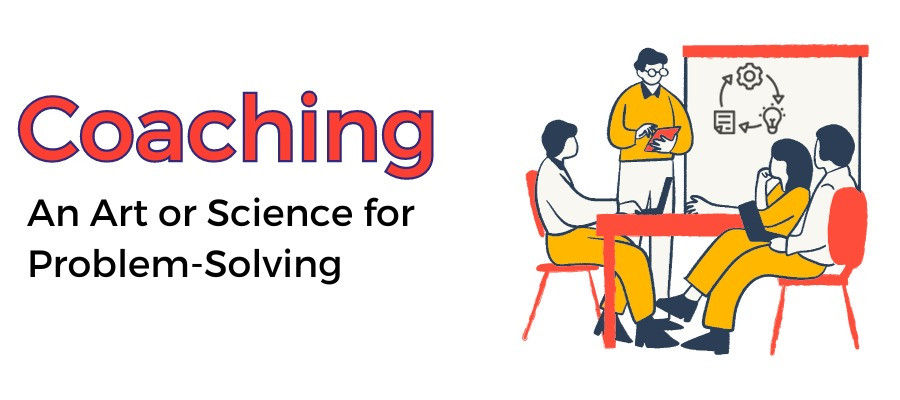Coaching – An Art or Science for Problem-Solving?

Coaching is a profession that blends elements of both art and science. It's a practice that's becoming more popular not only in sports and personal development but also in Agile teams.
Senior leaders and mid-level managers in organizations are turning to coaching as a tool for navigating complex problem-solving. In this blog, we'll explore whether coaching leans more towards being an art or a science and why coaching is the way forward.
The Duality of Coaching: Art vs. Science
To dissect the essence of Coaching, let's first understand the fundamental differences between art and science. Science is about systematically organized knowledge applied methodically to solve problems. It relies on data, facts, and a structured approach. On the other hand, art is an expression of human creativity and intuition. It thrives on imagination and individual interpretation. It's not just about what is visible but also about what is made visible to others through creative expression.
Now, consider this duality in the context of Coaching. Coaching, like science, involves a structured process of helping individuals or teams identify and tackle problems. It draws upon established techniques and methodologies, making it seem like a science. However, it also relies heavily on the coach's creativity and intuition to adapt to unique situations, much like an art form. Thus, Coaching is a fusion of both art and science, making it a powerful tool for problem-solving.
The Agile Software Development Perspective
To illustrate this fusion further, let's examine Coaching in the context of Agile Software Development. Unlike industrial production systems, software development remains a creative endeavor. It continually adapts to meet the dynamic needs of users and customers. Unlike manufacturing, where robots can be employed for repetitive tasks, dynamic human problems require a human-centric approach.
Agile software development operates in a state of complexity and uncertainty. To thrive in such an environment, organizations need a different approach—one that acknowledges the relative nature of complexity, empowers the workforce to make decisions with the best available information, and fosters a culture of continuous Learning.
Traditional management practices rooted in authority and control have often fallen short in Agile environments. This is where Coaching comes into play. A skilled coach, well-versed in Agile principles, can guide individuals, teams, and organizations in cultivating the mindset necessary for sustainable Agile Transformation.
The Attributes of a Coach
Coaching is not a one-size-fits-all endeavor. It demands a set of attributes from the coach, including the ability to influence without formal authority, manage cognitive biases, remain present at the moment, and avoid conflicts of interest. Coaches are often sought after for feedback, making it crucial for their feedback to be reliable and trustworthy. Integrity is paramount in this role.
Furthermore, a great coach must possess flexibility and creativity in their approach. Just as a chef cannot enhance the taste and texture of every dish with the same ingredients and techniques, a coach must adapt their methods to meet the unique objectives of their coachees. Mastery in Coaching lies in the ability to combine the science of structured processes with the art of creative adaptation.
Why Coaching should be Emphasized More?
Picture a workplace where the culture encourages team members to excel, support each other's growth, and collaborate on innovative solutions. Such a culture is nurtured by Coaching, creating a safe environment for these moments of growth to flourish. Within this context, Learning is not limited to formal channels; it can emanate from various sources within the organization – peers, managers, subordinates, and even external coaches. The idea is that when everyone within a company truly follows Coaching principles, everyone reaps the rewards.
For instance, many mid-level managers and senior leaders are filling in the need for Coaches in Agile teams. In organizations with a robust Coaching culture, individuals are equipped with fundamental Coaching skills. However, it's the organization's leaders, who already have experience, who fill in the significance of Coaching within their teams. They achieve this by actively promoting continuous personal development and behavioral change among their team members. They regularly provide diverse types of feedback and actively seek feedback in return, particularly from those they directly manage.
Most importantly, these leaders are creating a way forward to a more advanced workflow. They encourage their team members to discover solutions independently while offering unwavering support along the way. They also create opportunities for team members to develop further and leverage their strengths. When team members witness such positive Coaching models from their leaders, they are inspired to become effective coaches themselves, fostering a culture of mutual Coaching and growth.
Conclusion
In the grand scheme of things, Coaching is neither purely an art nor just a science. It's a harmonious blend of both, making it a dynamic and versatile tool for problem-solving. The corporate world is increasingly recognizing the value of Coaching as it grapples with complex challenges and the need for cultural Transformation.
Leaders at all levels are turning to Coaching to navigate the intricacies of the modern business landscape. Whether you are a senior executive seeking guidance in leadership or a mid-level manager striving for Agile excellence or simply a technical team member, Coaching can be the compass that guides you through the maze of uncertainties.
Reference
https://www.zenagile.com/agile-coach/
https://www.linkedin.com/pulse/why-agile-coaching-more-art-than-science-shibabrata-panda/



